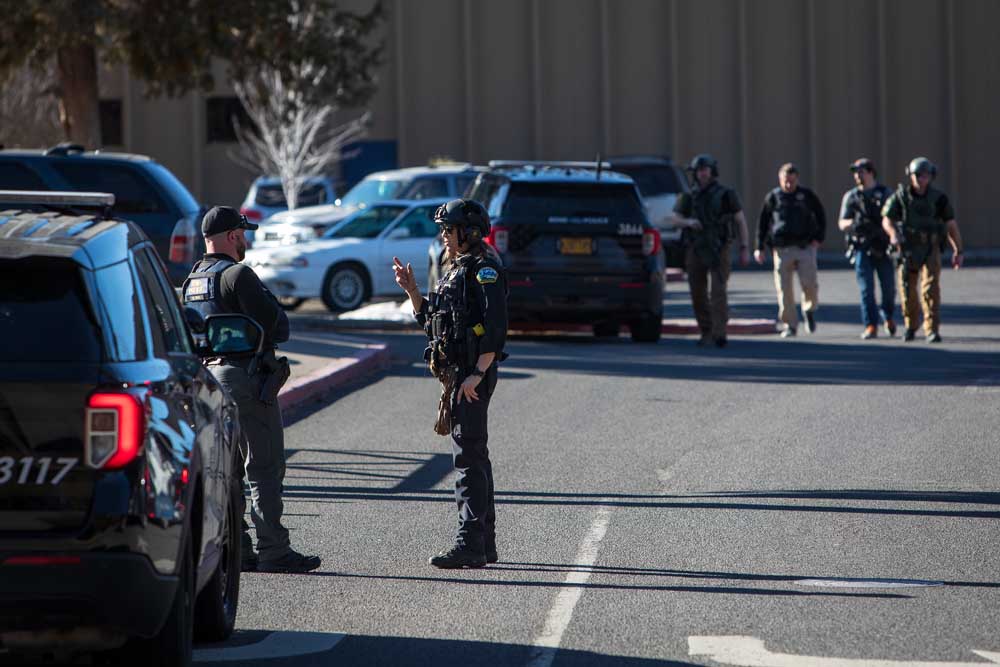‘Swatting’ threats place schools in panic, drawing concern from Central Oregon authorities
Published 5:00 am Wednesday, April 12, 2023

- Law enforcement officers are seen outside the Bend High School parking lot on Feb. 9 after a threat was called in to police. The threat turned out to be false.
As families learned in February that a threat to kill people inside Bend High School was unfounded, police raced to try and find the caller, according to reports.
Bend Police connected the number to an online account they believed would expire eight hours after it was created, and to an online network criminals can use to conceal their activity. They sent emergency requests to Comcast and Google for information.
Trending
They asked police to interview men in a retirement home and jail in Florida, according to police reports. With Google’s help, they traced the caller to multiple online accounts likely created in Romania. Still, they could not confirm where the call originated from that day.
Their efforts underscore the challenges law enforcement officials face while trying to track down suspects in the muddled online landscape. Here, criminals can work to cover their tracks while making “swatting” calls, which are increasingly impacting schools across Oregon and the country.
New records show disarray in Bend police, school district response to Bend High threat
“There’s countless ways nowadays where people can use anything, from fake email accounts to fake social media accounts, … to circumvent law enforcement’s ability to identify them,” said Bend Police Detective Eli Allen, who investigated the call. He added: “We take all these cases very seriously.”
Trending
Striking fear
The FBI and Bend Police determined that the caller who threatened Bend High came from out of the country but have not disclosed where. More than two months later, the FBI and Deschutes County District Attorney Steve Gunnels say they still don’t have any updates on the case.
Bend-La Pine School Board approves speeding up door lock replacement
On Tuesday, a caller told nonemergency dispatch that he had shot someone at a home on SW Taft Avenue in Bend and was still inside. Medics and two armored cars responded, said Sheila Miller, a police department spokeswoman. Police evacuated homes in the area and contacted the homeowners, who weren’t there. Police cleared the home and found no one inside or any evidence of a crime.
“Incredible waste of resources,” Bend Mayor Melanie Kebler said in a tweet on Tuesday. “Our department takes all calls seriously. I hope the person who made the false call is able to be identified and held accountable.”
Lack of empathy from the school district for event at Bend High
Though unfounded, these hoax calls are striking fear in students and families across Oregon and the country, all while mass shooting events are reaching national headlines with a frequency Central Oregon residents find frightening and dismaying.
“I’m sort of at a loss for words,” said Bend City Councilor Anthony Broadman, whose daughter was in Bend High on the day of the hoax threat. “I’m just really tired and frustrated of this being a constant threat over us.”
Harper Rich, an 18-year-old senior at Bend High, said the threat in February and the massive police response had a lasting impact on students. “For the week after, we were a bit on edge. It took a while for us to realize that, OK, we’re good,” she said, adding: “It was freaky. We were pretty rattled.”
She said the feelings from the threat were made worse by the fact that in August, a gunman opened fire at Safeway, killing two people and himself after making threats against her best friend’s high school.
Now, she said: “I’m definitely a bit more vigilant. There’s been shootings on the news the whole time I’ve been a student. It wasn’t this event specifically that made it real.”
Rising incidents
Law enforcement officials say these hoax calls — many of which are stemming from outside the country — are meant to instigate large and potentially dangerous police responses. They are wasting law enforcement resources, drawing police and other public safety authorities away from responding to legitimate emergencies.
“It increases the risk that somebody is going to make a mistake and an innocent person is going to be hurt,” said Gunnels.
FBI public affairs officer Joy Jiras said in an email that the agency is “aware of the numerous swatting incidents across the state wherein a report of an active shooter at a school is made.” Jiras could not provide details about the cases but said: “At this time, none of the threats have been legitimate.”
In Sherwood, the police chief said his office responded to 15 separate threats to local schools in May. In recent years, false threats have been reported against schools in Baker, Hermiston, Ontario, Enterprise, La Grande, Powell Butte, Sisters and Sunriver.
The threats shut down schools, disrupting student learning and wasting taxpayer dollars, authorities say. Such an act is typically considered first-degree disorderly conduct, lawyers say. Generally, a conviction can come with a year in jail but can escalate to a Class C felony if a person is convicted of the same charge a second time.
Citing concerns around such incidents and the fear they can reap in communities, Oregon lawmakers proposed House Bill 3035 this year. Sponsored by Democrats, the bill would have made threatening violence against a school or public building a felony offense. The bill received support from the Oregon School Boards Association as well as statewide law enforcement associations.
The bill, however, faced pushback from Disability Rights Oregon and the Oregon Criminal Defense Lawyers Association. The groups said in a joint statement that imposing harsher penalties would “sweep up young people and mentally ill people and make the cycle in and out of the criminal legal system incredibly difficult to break.”
The bill died April 4, when it missed a legislative deadline.
In Gunnels’ view, a person who makes deliberately planned and severe threats — like the one against Bend High — should face felony charges. Others, he said, should not, such as a youth who makes a threatening comment about a school to another student, or a person experiencing mental illness.
Matt Murphy, a supervising attorney for Deschutes Defenders, a public defense nonprofit, said the increase in threats could reflect the state’s failures to care for the mentally ill. He said that making swatting threats a felony “doesn’t address why it’s happening in the first place.” He argued that the state has long underfunded its psychiatric treatment facilities and should make additional investments to care for people with mental illness.
“We are seeing the long-term impacts of that all over the state,” he said.








